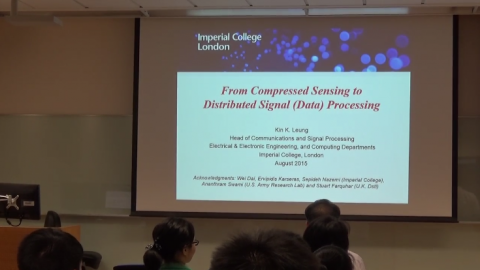
In this talk, the speaker will give a brief overview of compressed or sparse sensing to illustrate the use of various performance measures for tracking and prediction. By considering sensor networks with sparse signals and temporal correlated samples, he will show how a hybrid-Bayesian-Kalman technique can be helpful in exploiting both the sparsity and time dynamics of signals. Numerical examples using NASA ozone measurements will be provided. As the second part of this talk, the speaker will move on from centralized to distributed signal processing where signals (data) are fused (aggregated) along the way they are transferred toward the end user in the sensor networks. It will be shown that finding the optimal solution for the distributed processing problem is NP-hard, but a constrained optimization problem in a particular form can lead to a distributed solution framework where optimal decisions based on local information at each sensor node can yield the global optimal solution. Future work on integrating compressed sensing and other signal (data) processing techniques with the distributed solution framework will be discussed.
Kin K. Leung received his B.S. degree from the Chinese University of Hong Kong in 1980, and his M.S. and Ph.D. degrees from University of California, Los Angeles, in 1982 and 1985, respectively. He joined AT&T Bell Labs in New Jersey in 1986 and worked at its successor companies, AT&T Labs and Bell Labs of Lucent Technologies, until 2004. Since then, he has been the Tanaka Chair Professor in the Electrical and Electronic Engineering (EEE), and Computing Departments at Imperial College in London. He is the Head of Communications and Signal Processing Group in the EEE Department. His research interests focus on networking, protocols, optimization and modeling of wireless broadband, sensor and ad-hoc networks. He also works on multi-antenna and cross-layer designs for the physical layer of these networks.
Kin received the Distinguished Member of Technical Staff Award from AT&T Bell Labs (1994), was a co-recipient of the 1997 Lanchester Prize Honorable Mention Award, and was elected as an IEEE Fellow (2001). He received the Royal Society Wolfson Research Merits Award (2004-09), and was elected as member of Academia Europaea (2012). He has published 250+ papers and received 45+ U.S. patents. His results were applied to AT&T and Lucent products and services, while his recent work on WiFi technology went through a successful field trial at an airport. In terms of professional activities, he serves as a member (2009-11) and the chairman (2012-15) of the IEEE Fellow Evaluation Committee for Communications Society. He has also served an editor and guest editor for 10 IEEE and ACM journals, and as committee members of many technical conferences.
